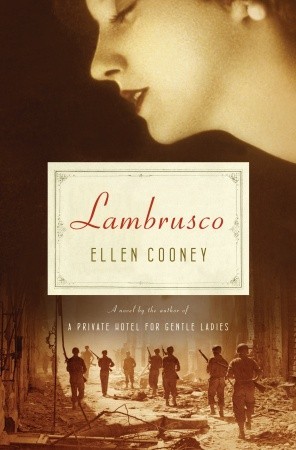Lambrusco
Pantheon, 2009
I’m the granddaughter of Italian immigrants. My grandfather forbade us to learn Italian, because “America is where we are,” but at the age of 50 I started language lessons, which took me to classes in Italy.
One day in Bologna, while planning a novel about a woman studying Italian, I happened upon a plaque to resistance fighters in WW2. My Italian was enough to let me talk to the group of elderly men who watched me looking at it, captivated.
I came to the word partigiani. In the distance, through an open window, came singing: opera, Rossini. Someone was rehearsing. The voice was female, beautiful. In the greater distance of time, American bombs were falling on this city; Nazis were trying to take it over; waiters from closed-down restaurants were leaving for the hills to become civilian-soldiers. That evening I drank my first glass of actual Italian lambrusco. And thus was born this novel about the extraordinary Resistance movement of the Italian people in the Second World War.
In my book, the year is 1943. Nazis have invaded Italy. American troops have landed. At Aldo’s restaurant on the Adriatic coast, Lucia Fantini, wife of the late Aldo, entertained customers for years with her opera singing, but normal operations have ceased. The restaurant has been seized by nazifascisti, and a resistance squad of waiters and tradesmen has been formed, led by Lucia’s son Beppino. When he disappears after acting on his own to destroy a German truck, Lucia asks, “What kind of a partisan are you, blowing something up without telling your mother?” and sets off to look for him.
It’s the story of a squad of resistance people. And a mother and son story. And a friendship and kinship story. And a survival story. And a love story too.
Praise & Reviews
“The author of the acclaimed A Private Hotel for Gentle Ladies has written a war story with personality.”
—New York Post
“Cooney’s darkly comic journey of revelation triumphantly demonstrates the sustaining power of love, duty, family, and friendship.”
—Booklist
“Lovingly presented . . . touching . . . Cooney explores how war causes not just injury to the body, but more importantly explains how every participant can be ‘injured in his nerves, in his self, in his soul.’”
—Kirkus
“This is surely Ellen Cooney’s most original work. Who else would have placed a squad of partisans in the Italian Resistance, who happen to be waiters in a seaside restaurant famous for the opera sung by the owner’s wife, against a backdrop of bombed, wartorn Italy? The effect is positively Felliniesque.”
—Anita Desai

